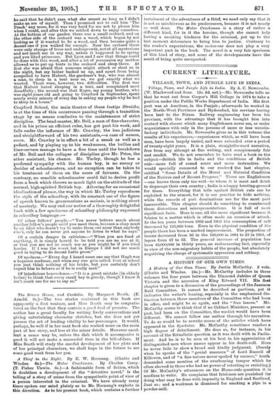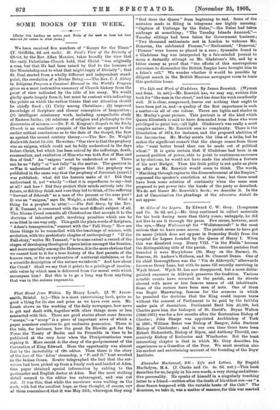Village, Town, and Jungle Life in India. By A. C.
Newcombe. (W. Blackwood and Sons. 12s. 6d. net.)—Mr. Newcombe tells us that he went out from Cooper's Hill College in 1874 to take a position under the Public Works Department of India. His first post was at Amritsar, in the Punjab ; afterwards he worked in the North-West Provinces and Hyderabad, his services having been lent to the Nizam. Railway engineering has been his province, with the advantage that it has brought him into contact with classes which many Englishmen never see, or make acquaintance with only in the persons of more or less unsatis- factory individuals. Mr. Newcombe gives us in this volume the results of his experiences,—experiences which, as will have been seen, have been largely varied, and were extended over a period of twenty-eight years. It is a plain, straightforward narrative, free from any attempt at fine writing, and conspicuously fair and candid. We do not remember to have read a book on the subject—British life in India and the conditions of British rule—more full of sound sense and more instructive. We would specially commend to our readers/ the last chapter; entitled "Some Details of the Moral and Material Condition of the Natives and of Recent Progress." There are Englishmen —one knows them only too well—to whom it is meat and drink to disparage their own country ; India is a happy hunting-ground for them. Everything that tells against British rule can be exploited to the utmost, for it is our practice to hide nothing, while the records of past dominations are for the most part inaccessible. This chapter should do something to countervail these distortions and misrepresentations. It is full of most significant facts. Here is one, all the more significant because it relates to a matter which is often made an occasion of attack. In the ten years between 1892 and 1902 the consumption of salt increased by 125,000 tons. Even in the physical condition of the people there has been a marked improvement. The proportion of insane decreased from 36 in the 100,000 in 1881 to 23 in 1901, of lepers from 67 to 33. The general increase of population has been 45,0000300 in thirty years, an embarrassing fact, especially in view of the non-migratory habits of the people, but absolutely negativing the charge of systematic oppression and robbery.
A HISTORY OF OUR OWN TIMES.
A History of Our Own Times. By Justin McCarthy. 2 vols. (Chatto and Windus. 24s.)—Mr. McCarthy includes in these volumes the, four years between the Diamond Jubilee of Queen Victoria and the accession of Ring Edward VII. His first chapter is given to a discussion of the proceedings of the Jameson Raid Committee. It cannot be described as partisan, yet it indicates the writer's leaning, especially in the emphasised dis- tinction between those members of the Committee who had been in office, and might be so again, and the "free lances." Mr. McCarthy seems to think that if no Cabinet Ministers, present or past, had been on the Committee, the verdict would have been different. We cannot follow our author through his narrative. To do so would be to rewrite scores of the articles which have appeared in the Spectator. Mr. McCarthy sometimes reaches a, high degree of detachment. He does so, for instance, in his account of the Ritualistic question as it was dealt with in Parlia- ment. And he is to be seen at his best in his appreciation of distinguished men whose names appear in his death-roll. Here he never fails to show a broad and kindly judgment. (Surely when he speaks of the "genial manners" of Lord Russell of Killowen, and of "a fine nature never spoiled by success," truth demanded some mention of the overbearing temper which he often showed to those who had no power of retorting or resisting.) Of Mr. McCarthy's utterances on the Home-rule question it is needless to write. He complains that Irishmen are punished for doing what may be done with impunity in England and Scotland, Just so ; and a workman is dismissed for smoking a pipe in a powder-mill Wader this heading we notice sash Books of Use INA as Mei not been reserved for review is other forms.] We have received five numbers of "Essays for the Times" (F. Griffiths, 6d. net each). St. Paul's View of the Divinity of Christ, by the Rev. Allan Menzies, takes broadly the view that the early Palestinian Church held, that Christ "was originally a man, but that He had been raised by God to the honours of the Messiahship and to what that might imply of Divinity" ; that St. Paul started from a wholly different and independent stand- point, the revelation of a Divine Being.—The Rev. C. J. Abbey in Religious Progress a Constant Element in the World's Progress gives us a most instructive summary of Church history from the point of view indicated by the title of his essay. We would gladly quote largely from it, but must be content with indicating the points on which the author thinks that our attention should be chiefly fixed : (1) Unity among Christians ; (2) improved knowledge of Scripture and clearer conception of Inspiration ; (3) intelligent missionary work, including sympathetic study of Eastern faiths; (4) relations of religion and philosophy to the discoveries of science.—Dr. F. G. Kenyon's Gospels in the Early Church is an excellent synopsis of the later as opposed to the earlier critical conclusions as to the date of the Gospel, the first as against the second century theory.—The Rev. Dr. Wright





















































 Previous page
Previous page